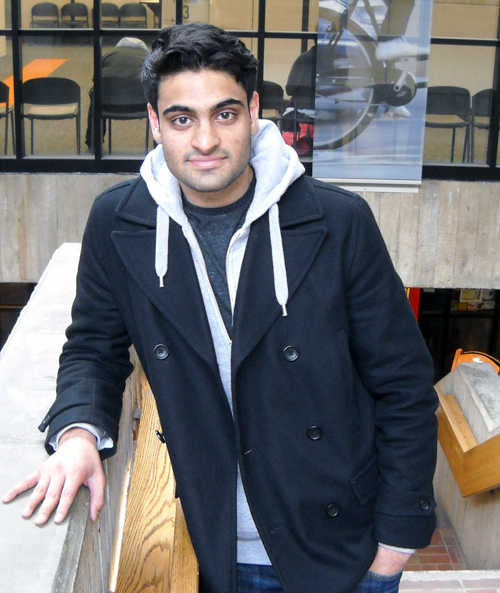
His Guelph undergrad degree first gave Zafir Syed a close-up look at the human brain. Now as a master’s student on his hometown campus, he hopes to help develop novel ways to treat brain cancer.
Syed studies therapeutic vaccines for treating cancer with Prof. Byram Bridle, who joined the Department of Pathobiology in early 2012.
Mention vaccines, and many people might think of preventive measures such as flu shots. No one is working on a handy jab to ward off cancer, says Syed.
“The flu vaccine is prophylactic,” he says. Referring to his work combining viruses and the body’s immune system to treat existing tumours, he adds, “This is therapeutic.”
Researchers in Bridle’s lab aim to treat cancer with a one-two punch.
They use antigens from an existing tumour to prime the body’s immune defences to fight the disease. And they harness oncolytic viruses, which prefer to invade cancerous cells rather than normal ones.
Bridle says this approach holds promise for a highly specific therapy to target cancer cells while leaving normal cells undamaged. Immunotherapy might also help doctors treat patients without some of the toxic side effects of other forms of therapy, notably chemotherapy and radiation.
“We will use parts of the tumour in a vaccine and hopefully retrain the immune system to see and attack the tumour itself,” says Syed.
So far, the team has worked only with mice, although they plan to test cats and dogs.
Syed is interested in brain cancer cases, especially in children. The young brain poses unusual challenges compared to other organs and tissues, he says. “Every case is different.”
Encased in the skull, the brain hides many physical symptoms that might show up more readily in tumours elsewhere. Often brain tumours develop for a long time before they’re found, reducing the chances for successful treatment.
The blood-brain barrier makes it difficult to treat these cancers with chemotherapy. In young survivors, both chemo and radiation affect rapidly growing cells in ways that might pose health problems years after treatment. Surgery can remove the primary tumour but not any metastatic cells moving to other parts of the body.
Syed has always been interested in science, particularly neuroscience. Several close family members have had neurodegenerative disease, he says. “I love learning about the brain.”
He had still been a student at Guelph’s Centennial CVI when U of G students visited to talk about the human anatomy program on campus.
He enrolled in engineering but switched to human kinetics. His brother, Imad, completed an engineering degree here in 2006.
Zafir ended up in that anatomy program himself, where he had a chance to dissect a donor cadaver’s brain. He says that course was especially valuable: not only did he learn about human anatomy, but he also helped instruct other students in turn.
He also volunteered with the Library’s Supported Learning Groups. A big U of G booster, he says the campus is large enough to attract and sustain high-quality researchers but small enough that students can get to know their classmates and professors.
He completed his undergrad in 2012. That year, he served as president of both the College of Biological Science Student Council and the Muslim Students Association, and received a “Be the Change” award from Student Life.
Born in Dubai, he came to Canada with his family at age nine and lived in Brampton, Ont., before moving to Guelph while in middle school. He plans to apply to medical school.